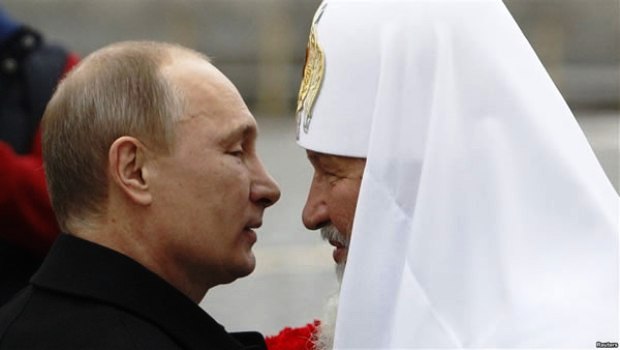Index relies entirely on the support of donors and readers to do its work.
Help us keep amplifying censored voices today.
Russia’s new blasphemy law is censorship under the guise of protection for believers, says Padraig Reidy

In his speech on Russia’s Constitution Day in December 2012, Vladimir Putin bemoaned the decline of spiritual values.
“Today, Russia suffers an apparent deficit of spiritual values,” said Putin, as his Orthodox ally Patriarch Kirill nodded along.
The former KGB man continued: “We must wholeheartedly support the institutions that are the carriers of traditional values.”
So far, so Mother Russia.
What was interesting was that the president went on to say that it would be “amoral” to create laws governing spirituality. Putin commented ““Any attempts of the government to intervene with people’s beliefs are effectively a sign of totalitarian rule. It’s absolutely out of the question. It’s not our way.”
This would seem at odds with this week’s passing of a new blasphemy law, which will impose prison sentences and fines on people convicted of “public actions expressing clear disrespect for society and committed with the goal of offending religious feelings of the faithful”.
But it is in fact very much in the mould of the current trend for religious defamation law.
Traditionally, blasphemy was the crime of causing offence to God himself; now it is recast as causing offence to believers. Blasphemy laws are here to protect us. Look back at the testimony durings Pussy Riot’s trial, and again and again you hear the stories of poor innocent believers who were shocked by the women’s behaviour; even if the Patriarch and the president had wished to forgive the punk group, they had to think of the poor pious babushkas who had been rocked to the very core by an act that some admitted to not actually having witnessed.
Shamefully, Ireland has led the way in this trend. The Irish Defamation Act of 2009 established definitions and punishments for blasphemy where none had previously existed (in spite of the fact that the 1937 constitution recognised blasphemy as a crime, it did not define what blasphemy was, and thus, there had never been a conviction for blasphemy, or even a full trial, in the country).
The Irish law defines religious defamation as any action likely to cause “outrage among a substantial number of the adherents of [a] religion”, with fines of up to e25,000 payable by those found guilty.
The wording of the Irish bill was used as a template in the Organisation of Islamic Conference’s attempts to get the UN to recognise religious defamation as a crime.
Of course, the old-fashioned definitions of blasphemy still exist: in Egypt this week, writer Amer Saber was given a five-year sentence for “contempt of religion” for authoring a short story collection called “Where is God?”. And in Syria, a teenager was reportedly shot in front of his family merely for uttering the name of Muhammad. The abuses of blasphemy law in Pakistan are only too well known.
But the justification for blasphemy laws, as with many other censorious impulses, is increasingly tied up in the idea that people should be protected from offence, from controversy, even from being challenged.
Perhaps the most offensive notion is that we cannot deal with ideas, even aggressively expressed ideas, that we disagree with. Government’s such as Putin’s are all too happy to shut down free speech and repackage censorship as benign protection.
Tennessee Department of Justice Attorney William Killian has recently raised eyebrows for suggesting that anti-Muslim messages online could be prosecuted under federal laws. Sara Yasin questions if his approach will help anyone
Recent decisions by India’s Ministry of Information and Broadcasting have raised questions about the country’s approach to broadcasting regulation. Mahima Kaul reports

Comedy Central ran afoul of India’s Ministry of Information for broadcasting content considered obscene.
Both Comedy Central India and Fashion TV were slapped with 10-day suspension notices for violating the Cable Television Networks Regulation Act, 1995. The reasons for the ban – listed in a detailed letter by a ministry official – included offending good taste, obscenity, injuring public morality and denigrating women.
Two Comedy Central programs in particular drew the government action. French prank show, Popcorn, and a stand-up comedy showcase. The French program featured simulated sex with a dummy. The suspension began on 25 May and was appealed by the station’s operator, joint venture Viacom 18 Media. The ban was initially upheld, but lift after a second appeal on 28 May.
Fashion TV drew a 10-day ban after it aired obscene content that included models in lingerie with their buttocks fully exposed.
In appealing its ban, Comedy Central pointed out it is a niche channel catering to a sliver of the English speaking public in India. The broadcaster believes that its viewers will not be offended by the programming it airs.
The government says it is trying to walk a fine line between freedom of expression and vulgarity. Finding that line is difficult in a country that has gone so far as to ban mannequins dressed in underwear in Mumbai shops because the displays lead to a “pollution of minds in today’s generation.”
India’s broadcasters see self-regulation as the way forward, and as a result, interference from the government is met with a harsh backlash. Currently, public complaints against general entertainment channels are funneled to the channels through avenues such as the industry-led Broadcast Content Complaints Council. In fact, the BCCC has a list of published “self-regulation guidelines” on its site which are open to the public. The list of topics that people can complain includes kissing, nudity and sex. In fact, a look at BCCC’s action-taken documents show the body has evenly protected channels as much as it has taken them to task for their content. This includes Comedy Central in the past. However, experts believe that the body has been lenient on its members because their interest lies in letting their programming go unopposed — as it stands today. Self regulation in India is under scrutiny, with even the judiciary asking the BCCC to pull up its socks in the past.
In the present case of the Comedy Central ban, the government had issued a notice to Comedy Central last June to which the channel responded a month later, saying it had taken a “serious note of all concerns”. However, with repeated offenses, an Inter-Ministerial Committee decided to impose the ban as punishment. The government believes the channel has failed to self regulate and follow applicable programme codes, and therefore the penalty must be imposed.
Comedy Central believes the government should have gone through the BCCC instead of direct action from the ministry.
Three things emerge in this case. The first is that the nature of the complaints as well as the public backlash at any action against channels reveals the very contradictory nature of India’s viewing public right now. The second is that if, as most channels agree, self-regulation is the best way forward, then the government might want to rely on the industry for disciplinary action, even though it has the power to impose bans. The third is that the industry should hear the government loud and clear: if self regulation is not working, it intends to step in.
Tunisian activist Amina Tyler was arrested on Sunday (19 May), after allegedly attempting to stage a topless protest in the central Tunisian city of Kairouan.
Tyler, who heads Tunisia’s branch of feminist movement FEMEN, first faced controversy in March, after posting topless photographs online. Ukranian feminist group FEMEN is notorious for its brand of bare-chested protest.
Hardline Salafi group Ansar al-Sharia was set to hold their annual congress in Kairouan on Sunday, but authorities banned the gathering. Tyler passed through the heavily guarded checkpoints around the city, set up to enforce the ban on the Salafi gathering. Salafis in the city clashed with security forces shortly before Tyler’s arrest.
The activist reportedly painted the word “FEMEN” as well as anti-salafist slogans on a cemetery wall near al-Okba mosque, one of Tunisia’s most important and historic religious sites. Collective blog Nawaat released a video of Tyler’s arrest — which occurred shortly after she was surrounded by local residents yelling for her to leave. Local police said that residents became enraged once Tyler attempted to take off her clothes.
A spokesman for Tunisia’s Ministry of Interior on Monday called Tyler’s protest “an act of provocation”, and “against the morals and traditions of Tunisian society, which is a Muslim society.” Tyler has not yet been charged, but she will appear in court today. Public indecency is punishable under Tunisian law, and if charged Tyler could face up to six months in jail.
Sara Yasin is an Editorial Assistant at Index. She tweets from @missyasin